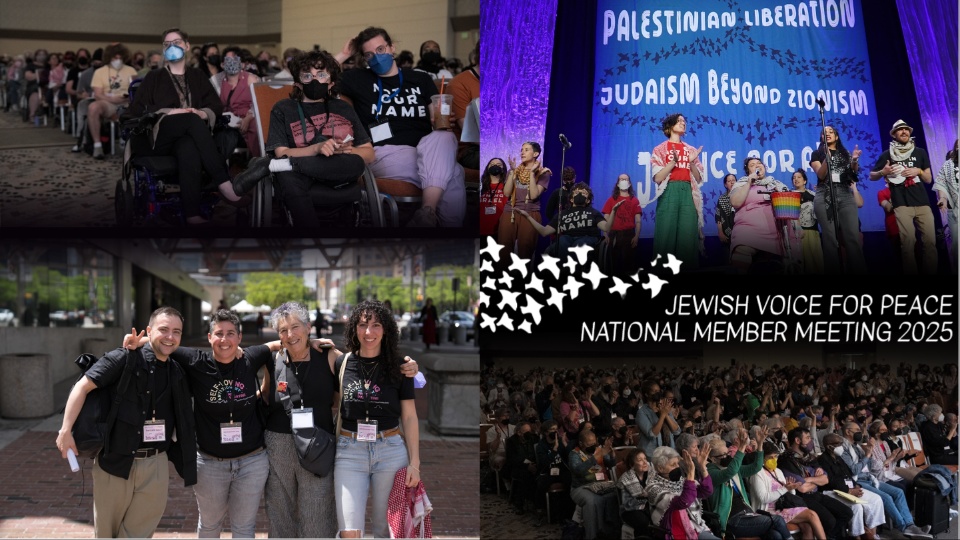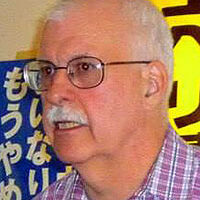
BALTIMORE—Jewish Voice Peace, founded in 1996, is now one of the leading organizations in the U.S. fight against genocide and campaigning for equal rights for Palestinians, both in Palestine and the U.S. The centrality of that issue today means that JVP is also one of the leading national organizations in the U.S. peace movement.
At JVP’s National Membership Meeting in Baltimore last week, the group’s executive director, Stephanie Fox, told attendees they have to “get organized to make our strongest possible contribution towards Palestinian liberation and to interconnect struggles for justice in the U.S. and around the world.”
Over 2,000 attendees attended the four-day conference, the largest meeting JVP has held so far. There were five plenaries, 90 workshops, numerous meetups, and beautiful banners and artwork on display. Jewish cultural traditions were honored along with other side activities.
JVP has seen substantial growth in recent years, especially after the Israeli-U.S. genocide launched in October 2023. The conference captured the urgency of the moment, high energy, and the good feeling of so many committed activists gathered and working together. Meeting security was very well organized, the small counter-protests barely noticed. A know-your-rights flyer was stuffed into every program book for members to take home with them.
The conference featured a number of well-known speakers, including Rep. Rashida Tlaib, Omar Barghouti, Angela Davis, Naomi Klein, former Rep. Cory Bush, Phyllis Bennis, and others. Movement organizations were involved, such as Rising Majority, Adalah, U.S. Campaign for Palestinian Rights, Democracy Now, and the Movement for Black Lives.
First to speak at the opening plenary was Rep. Rashida Tlaib, who was greeted with a raucous standing ovation as soon as she entered the hall. Tlaib, the sole Palestinian in the U.S. House of Representatives, began not with Palestine but by calling for peace and an end to repression.
She characterized the Trump administration’s trillion-dollar military budget as “spiritual death” and called for funding education, health care, and social programs. Then she told stories about what her mama thought of her political career. It was a unity speech for the peace movement.
The solidarity theme was carried forth by the rest of the panel, which included Omar Barghouti, co-founder of the Boycott, Divestment, and Sanctions campaign (BDS), one of the most successful campaigns of the Palestinian struggle. Barghouti spoke by video; his attempt to join the meeting in person was blocked by the Israeli government.
Palestinian photojournalist Motaz Asaiza described documenting the genocide, exhibiting great personal courage. The Israeli government also blocked his attendance.
Angela Davis closed the evening by weaving in the theme of intersectionality, connecting the struggle for Palestine’s rights to the struggles of African-Americans and women for equality. She commented, “It seems like we are experiencing a final conflict.”
Interestingly, the opening panel consisted of four people of color, none of whom were Jewish. All the panelists emphasized their opposition to Zionism and the Israeli government while embracing friendship with the Jewish people and respecting the traditions of Judaism.
The conference had a practical, organizing bent; a “Fight to Win: Organizing for Material Change” plenary discussed the diversity of strategies. JVP communications director Sonya Myerson Cox gave basic techniques for delivering your story effectively, such as staying on message and continually repeating the message in different media. This requires intentionality and discipline.
The job is to weaken the US-Israel alliance; there are three pillars to focus on.
- The economic is to create cracks on the financial edifice, such as the Boycott, Divestment and Sanctions campaign and the growing divest Israeli bonds movement. Those bonds are now rated as junk bonds.
- The war continues in part because it is profitable for some corporations and the military-industrial complex. We must make it unprofitable; there are victories such as Ben and Jerry’s and Veolia Company pulling out of Israel, Intel cancelling a 25 billion dollar contract.
- Investing in Israel now is both risky and bad public relations. Many high-tech startups are leaving Israel, which has big economic problems.
There has been a major change in public opinion since Oct. 7, 2023; a majority of Americans now support a ceasefire and stopping military aid to Israel. But the change in public opinion has not resulted in a material change on the ground; conditions actually continue to worsen. As strong as the movement is, it has not saved Palestinian lives.
The question, conference speakers and attendees said, is power; activists in the movement must build on their success in educating the public to move towards changing policy and actually stopping the genocide. To do that, they must contend in electoral politics as well as other arenas, including at the national and local levels.
Political officials have the power to decide things, so the movement has to make a new generation of politicians accountable on the Palestine issue. Upholding the framework of international law and publicizing the favorable rulings of the International Court of Justice are key tasks. While constantly violated by the U.S. government and the State of Israel, international law is still widely respected and carries a lot of weight in most countries around the world.
Direct action and nonviolent civil disobedience actions were another key topic of discussion. Past actions by JVP activists have gotten a lot of media attention—the protests at Grand Central Station, the Capitol Rotunda, Trump Tower, and the New York Stock Exchange, to name a few.
A speaker from Rising Majority affirmed the emerging new coalition of anti-MAGA forces and JVP’s place within it. He discussed the need for building a coalition which includes centrist Democrats as well as left organizations, but he also posed the perennial question of how does such a broad group work together despite organizational and ideological disagreements?
On May 2, the “This Political Moment” plenary brought JVP Executive Director Stephanie Fox as mediator together with panel members Robin D.G. Kelley (professor at UCLA), Dr. Thaer Ahmad, (Palestinian American Medical Association), Eran Efrati (JVP Director of Campaign and Partnerships), Professor Noura Erekat (Human Rights Attorney), and author Naomi Klein.
Fox began by helping the crowd acknowledge that the current political moment is not completely unique. Killing Black, brown, and Indigenous people has been a government practice in this land since before there was a United States, for instance. After ousting Spain from the Americas, the U.S. transformed its armies into occupying and colonizing forces. SWAT techniques trialed in Vietnam were brought back to Chicago to attack the Black Panther Party. U.S. history is the story of the ruling class exerting pressure on the people at home and abroad.
The panel discussion centered on the worsening conditions and the atrocities committed by the Israeli military in Gaza and how international health organizations have either failed to aid or have been blocked from aiding the people there. Israelis are accepting a “forever war and surveillance state,” one speaker said, in an attempt to eliminate the indigenous population of Palestine.
One quote particularly stood out: “Israel is a military industry with a state attached.”
On the global stage, the U.S. position of support for Israel is a minority stance, and Israel is losing the war for public opinion. There is a paradigm which equates global Jewish safety to emptying Palestine of its people, but now there are even Zionists who are losing faith in that zero-sum paradigm.
One of the goals for JVP and similar organizations is to “build off-ramps for them.” This thought was echoed in other workshops. One attendee said, “There is, right now, movement—and we can intersect ourselves into that flow and bring people to us.”
The workshops ranged from political conceptualization to granular discussion of tactics. In regard to the latter, three workshops provided a lot of good information.
- The “Media” workshop focused on looking for the cracks in the media structure locally, getting close to good reporters, using bloggers to get out the news, and making sure that communications committees are helping make decisions BEFORE events.
- A session on “How to Organize a Statewide Lobby Day” took on the question of influencing Palestine policy at the state level. The International Holocaust Remembrance Act, introduced in many state legislatures, compels activists to talk to their state representatives, delegates, and senators, not only the U.S. Congress. Similarly, Israeli bonds, “deadly exchanges” (collaboration of Israeli and U.S. police forces), and the tax-deductible status of settler-supporting non-profit organizations require a state-by-state approach. More directly, Israeli arms embargo resolutions from many states can push Congress to face the issue and cast votes to save Palestine.
- A new concept in the ‘FUNdraising’ workshop was led by NYC JVP—redistribution. In the next 25 years, $73 trillion will be transferred from the Baby Boomer generation to its heirs. People who want to invest in the society we are building are open to developing relationships with fundraisers. And although it is counterintuitive, fundraising for other groups can bring financial gains to both organizations.
Saturday’s final breakout session was regional meet-ups. Building coalitions without compromising, bringing children and childcare into activist work, organizing outside of cities and inside of schools, and picking local races to support were a few topics that garnered interest.
Lessons learned for activists:
1. Engage on important political differences. Today, JVP is an anti-Zionist organization; this was not always the case. In its early years, there were big differences on Zionism, and JVP did not support BDS. These issues were emotional and intense for many members. Should activists avoid the controversy and some hard feelings? No way, it was said, do the right thing.
After an extended period of discussion and debate, JVP in 2019 decided to become an anti-Zionist organization and embraced BDS. Those who ‘lost’ the debate on Zionism are treated with respect, as evidenced in the central slogan “Palestinian Liberation, Judaism beyond Zionism, Justice for all.” Had JVP avoided the tough issues, it would never have attracted the many young organizers in the audience.
2. Inspire both vision and clear self-assessment. JVP spent little time hyping its impressive accomplishments; rather, it was clear on its actual capacity and the limits to its ability to achieve its goals on its own. A big, powerful, intersectional movement is necessary, therefore, the JVP’s goal is to play its role and contribute to building that movement in the best possible way.
3. Embrace and properly balance collective action and individual needs. Director Stephanie Fox repeatedly emphasized the necessity of collective action for powerful, maximum impact. But there was considerable attention given to appreciating the need of individual members for support and encouragement in these difficult times. The opposition wants to normalize genocide and isolate and silence critics. While activists experience doubt and fear, the response has to be collective action. Each person has their own best way to contribute to collective action.
We hope you appreciated this article. At People’s World, we believe news and information should be free and accessible to all, but we need your help. Our journalism is free of corporate influence and paywalls because we are totally reader-supported. Only you, our readers and supporters, make this possible. If you enjoy reading People’s World and the stories we bring you, please support our work by donating or becoming a monthly sustainer today. Thank you!












